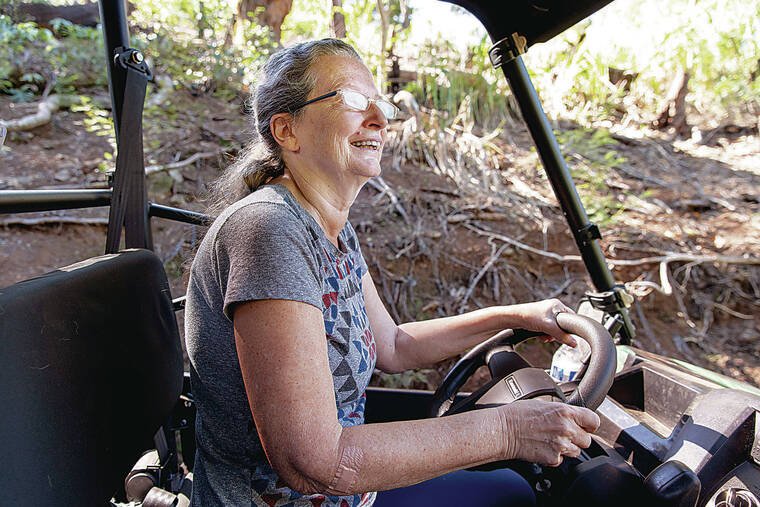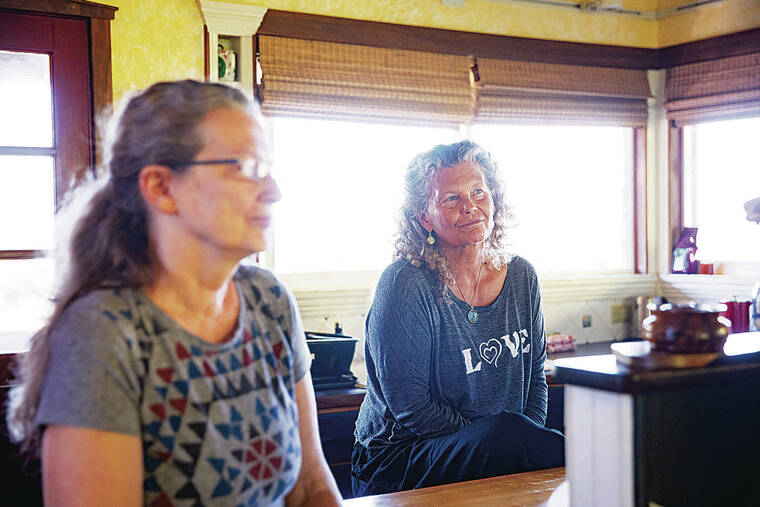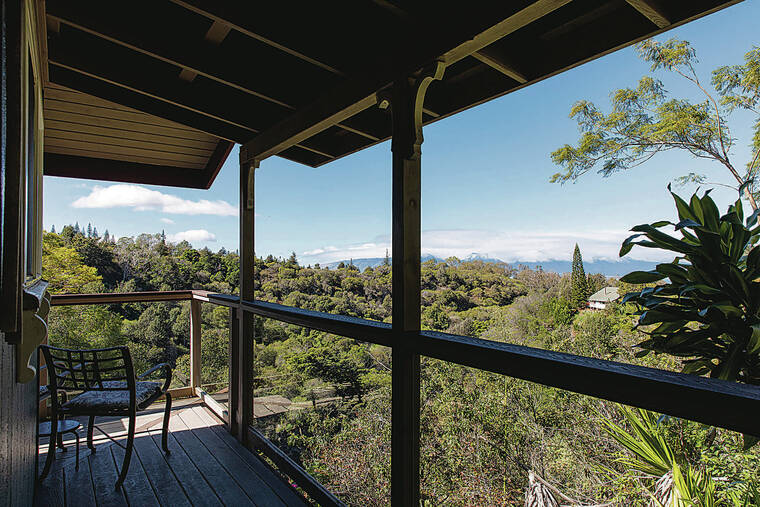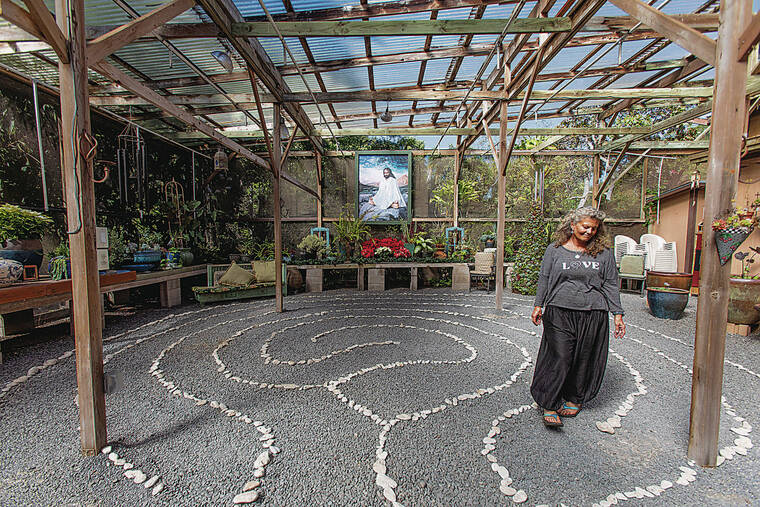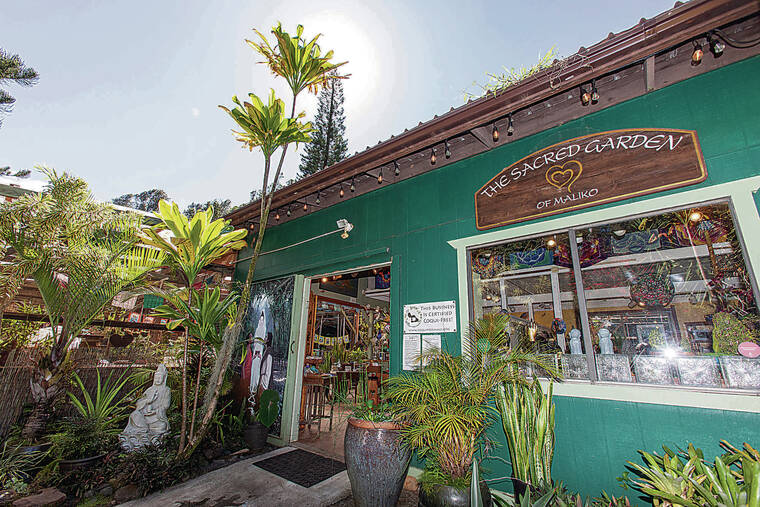MAKAWAO >> Finding housing for survivors has emerged as a top priority in the wake of the devastating Maui wildfires, but many fear that proposals coming forth to convert vacation rental units will jeopardize some businesses still struggling to stay afloat after the pandemic and since Lahaina’s destruction.
Sydney Smith, owner of Maliko Estate Coffee, offers farm stays in unique cottages perched atop jungle gorges to subsidize the cost of keeping her Makawao coffee farm running and to support archaeological work on the property’s historic sites, including a stream and waterfall where ancient Hawaiian petroglyphs adorn the basalt walls.
Farm stays are an allowable accessory use on agricultural land and Smith said the cottages are licensed vacation homes that are registered with the county and state. She said before she and her husband Maurice bought the 20-acre agricultural parcel it had been used for illicit purposes, including drugs and illegal dumping.
“We turned a garbage dump into a coffee farm,” Smith said. “My husband (Maurice) and I spent five years restoring the ecology of the stream. When we moved the garbage, we found the petroglyphs and contacted archaeologists, who have been working on the site.”
Down the road, her friend and fellow vacation rental owner Eve Hogan also turned a former drug haven into The Sacred Garden, a 10,000-square-foot nursery, peace sanctuary, botanical garden, with a temple and two walking labyrinths. She uses farm home stays to support her nonprofit called the Divine Nature Alliance, which sponsors complimentary entrance fees to the site, which is open every day from at least 9 a.m. to 5 p.m.
“I’ve been seeing fire survivors visit,” Hogan said. “This is a very healing place.”
Both women say they are proud of the improvements that they have made to their properties, which were once the dregs of the neighborhood. They say their farm stays also have allowed them to create a regenerative tourism market that supports Makawao and Haiku businesses.
Over the years they have survived governmental pushback on vacation rentals, which since the growth of hosting sites has had a complicated relationship with some Maui residents.
But they worry proposals from Maui County Mayor Richard Bissen and Gov. Josh Green aimed at compelling vacation rental owners to turn their properties into longer-term housing for Maui wildfire survivors might be their end, and more broadly would essentially equate to another tourist shutdown, which could irreparably harm businesses, especially those that barely survived COVID-19.
“We are considering moving to Mexico,” Smith said. “We are getting older and we can’t do the farm work ourselves. If we have less revenues, we can’t pay our farm workers. It’s unsustainable.”
Hogan said also at risk is The Sacred Garden, which employs seven people. She said The Sacred Garden Retreat also has created jobs for three yard people and two to three cleaners.
“In 2008 when former Maui Mayor Charmaine Tavares was in office and started going after all the vacation rentals and (bed-and-breakfast homes), the mom-and-pop shops withered on the vine,” she said.
Smith added, “I know business owners who lost homes.”
While businesses are at risk again, clearly greater sympathy lies with the thousands of displaced fire survivors. A grassroots organization Lahaina Strong is using fishing rights to camp on Kaanapali Beach to highlight the need for dignified longer-term housing for fire survivors. Unions representing Maui hotel workers, including Unite Here Local 5 and ILWU Local 142, were joined by government officials in a march in West Maui on Dec. 20 to “call for solutions that address both the short-term and long-term needs for housing in Maui including rent control, eviction protection, and the permanent conversion of short-term rentals in residential neighborhoods to long-term rentals.”
FEMA spokesperson Nicole Timon-Shipman told the Honolulu Star-Advertiser in an email Thursday that there are still 6,060 people in the FEMA Non-Congregate Sheltering program, which operates in Maui hotels. Timon- Shipman said so far the FEMA Direct Lease program has provided housing for 59 households and 1,377 eligible households are waiting for placement in the program.
The County of Maui told the Star-Advertiser in an email Thursday that it is “seeking approximately 2,700 rental units for fire survivors, and some of those may come from property classifications other than short-term rentals, such as timeshare or non-owner occupied.”
To get there, Bissen proposed Bill 131, which the Maui County Council approved Dec. 15. It provides an 18-month exemption from real property tax for units leased to people displaced by fires by Feb. 1 with those leased by March 16 earning an exemption for the next fiscal year. Bissen, who said housing Maui’s fire survivors warrants a “shared sacrifice,” also plans to introduce legislation that will increase property taxes for short-term vacation rentals, timeshare units and nonowner- occupied properties valued at over $1 million that do not sign up for the tax break program.
Under the covnversion plan, short-term rentals that convert to longer-term rentals could get compensated up to $5,000 a month for a studio and $11,000 per month for a four-bedroom home. However, monthly rates on the popular hosting site VRBO for January currently range from more than $7,000 for a one-bedroom in Kula to more than $30,000 for a two-bedroom at the Westin Nanea.
Green has said if enough conversions do not take place, he could use his emergency powers to implement a Maui short-term rental moratorium as early as mid-January.
“It’s my job to take the hard position if our people aren’t being taken care of,” Green said. “I do want to be blunt … I’m going to drop the hammer. At the end of the day, housing our local people is more important.”
While these emergency- based actions might solve an urgent problem, evaluating these solutions is complicated. On the one hand, thousands of Maui wildfire survivors need housing now and there is a dearth of affordable housing available on Maui or in the pipeline. Also, hotels, which comprise the bulk of Maui’s lodging inventory, are unlikely to see full recovery of tourism revenues and jobs until Maui wildfire survivors are relocated to longer-term housing.
On the other hand, since vacation rentals comprise about a third of Maui’s lodging, a moratorium could lead to fewer visitor arrivals as visitors that prefer staying in vacation rentals might balk at booking hotels instead. The proposals also could reduce Maui’s property tax collections or transient accommodations tax collections.
County officials have said they are still calculating the potential shortfall from tax exemptions.
The shortfall will depend on how many owners opt in to receive tax exemptions, as well as the types of tax classifications the properties are in,” the county said. “The shortfall will be addressed in the next budget cycle and is at the discretion of the Mayor’s budget and the County Council’s approval of that budget.”
The county said Thursday that it would hold a news conference in a week or so to update housing options for wildfire survivors.
Smith hopes the county will consider a recommendation that she has shared with officials to buy one or several Maui buildings near the shoreline that are in danger of getting condemned in the future due to sea-level rise.
“It would avoid the litigation and house the west side people for as long as needed. Then the building can be demolished when the need is over and the property or properties can become a park,” she said.
Maui Chamber of Commerce President Pamela Tumpap said the chamber supports the tax-relief option to incentivize conversions, but objects to increasing taxes for business owners that do not participate or implementing a moratorium.
Tumpap said short-term rentals on Maui were closed after the fires until the government allowed nonessential travel, and then took bookings in response to that guidance.
She said turning vacation rentals into longer-term housing is not the easiest option since most come with high homeowner association fees and many don’t allow pets.
“I don’t why why this has moved forward so quickly. Why weren’t we doing this option while rebuilding with some more sturdy permanent private solutions at least in tandem?” she said.
Tumpap added that the immediate use of compulsory programs by government officials is disappointing, especially since there are other options.
“There is a program through the Council for Native Hawaiian Advancement that was just announced. We have set them up with the trade group Professional Rental Management Association to try to help.”
CNHA’s leasing program was launched Dec. 21 and since then has received over 400 applications from second home and short-term rental owners willing to open their homes to displaced survivors. CNHA said it is currently working with 165 landlords in the program, which was seeded with $2.4 million from American Red Cross and $1 million from CNHA’s Kako‘o Maui Fund. CNHA said it is in discussions with the state to add to the program’s funding.
CNHA also is running a program that reimburses people who are hosting fire survivors and is getting ready in mid-January to implement a program that provides $50,000 in forgivable loans to people who are willing to construct an accessory dwelling unit to house a survivor.
CNHA CEO Kuhio Lewis said, “There is no simple solution to addressing the housing crisis on Maui. It will take government, philanthropy, and the private sector working together to overcome this situation, and that is occurring. It will also take a multifaceted approach that includes building homes, converting short term rentals to long term, and working with hotels. The road ahead is long and challenging but not impossible.”
Paul Brewbaker, principal of TZ Economics, and other economists maintain that building more housing on Maui is key.
“The problem of inadequate supply cannot be solved by any means constitutional or unconstitutional involving compulsory takings of private real property and the returns accruing to investors from ownership with the intent of suppressing housing or lodging demand., ” Brewbaker said. “The supply problem can only be solved on the supply side of the market.”
Moreover, he said withdrawing significant numbers of units from Maui’s visitor inventory, “would in and of itself impair tourism performance, reducing incomes, jobs, tax revenues, and reduce overall Maui economic output. People who lose their jobs and incomes, and the lost revenues of owners of businesses which otherwise might have employed them, are unlikely to be able to pay rent or mortgages or anything else.”
WHAT’S THE IMPACT OF REMOVING 3,000 SHORT-TERM RENTALS FROM MAUI?
Paul Brewbaker, principal of TZ Economics, provides a rough estimate of the economic impacts of removing 3,000 of Maui county’s short-term rentals from short-term rental use.
Maui impacts
>> $877 million foregone in Maui output
>> $244 million foregone in Maui workers’ earnings
>> $45 million foregone in Hawaii state tax and other revenues associated with the Maui economic impact
>> 4,654 Maui jobs foregone the first year, with slightly smaller numbers foregone annually thereafter because of productivity growth
Statewide impacts
>> $1.05 billion foregone in statewide output (not the same thing as GDP, but in the ballpark)
>> $289 million foregone in statewide workers’ earnings
>> $53 million foregone in state tax and other revenues
>> >5,489 jobs foregone
Source: Paul Brewbaker, principal TZ Economics
